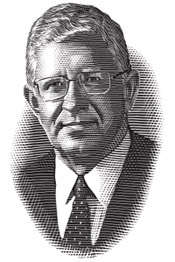|
||
     |
President Don M. Randel argues that investing in higher education offers long-term returns in the national interest.
 We
have begun a new year in which world and national affairs will be extraordinarily
challenging. The nature of these challenges is such that this University,
and higher education generally, must play comparably important roles. And
yet the nation is in grave danger of failing to notice this imperative.
We
have begun a new year in which world and national affairs will be extraordinarily
challenging. The nature of these challenges is such that this University,
and higher education generally, must play comparably important roles. And
yet the nation is in grave danger of failing to notice this imperative.
To address the national issues, to the extent that they can be separated from the world issues, many people now agree that the nation must bring spending more nearly in line with income. But no matter what one believes about the need to control mushrooming deficits—or to manage the national debt, support the dollar in relation to other currencies, and control the size of the federal government—it cannot be supposed that reducing support for access to the world’s best system of higher education and reducing support for the basic research that has produced the world’s most powerful economy and strongest national defense is the solution.
Yet, among the very first signs of what might be in store have been announcements that the National Science Foundation’s budget will be reduced and that new Pell Grant guidelines will deny eligibility to approximately 90,000 students who would otherwise qualify. For a start, we should make clear that the amounts of money entailed in these two items are pathetically small compared to the fiscal problems that need to be addressed. We are talking about hints of priorities here and, dare I say it, values.
One would have thought that the economic, if not the moral and philosophical, case for both higher education and basic research had been made by history. But the United States is a culture with a short attention span, and we seem to be less and less inclined to worry about the bottom half of the income distribution. The result is a disinclination to see how investments in education and research are the surest means both to lasting economic strength and to creating a society that will have less need for the entitlements that some will claim are the principal cause of the nation’s fiscal problems.
The United States will continue to prevail in global economic competition only if it continues to have the best-educated populace. This populace will necessarily include many who come from abroad in search of the education that can ensure their personal success in the competition. If we make it harder for both our own citizens and for foreigners to gain access to our system of higher education, and if we at the same time invest less in our institutions of higher education, we will cede to others the advantages that higher education has given to us. But the signs are clear. We are spending less on higher education, and the number of students from abroad is in decline [see “Figure 1,” —Ed.]. Soon it will be the United States that suffers from a kind of brain drain when foreign students no longer study here and stay here to contribute to our formation of intellectual capital.
Reducing investments in basic research will also cede to others the advantages obtained after World War II, when basic research was understood to be part of what universities pursued in the national interest. Even if we were to set aside, as we certainly should not, the exercise of human curiosity for its own sake, basic research has led to the discoveries that have powered the economy and made the lives of people around the globe fuller and better.
Is this special pleading on the part of elite institutions? Hardly. Private institutions have subsidized the national interest both in increasing access to higher education and in undertaking basic research. In neither domain do universities like ours recover their true costs from the government. It is private philanthropy that created these institutions and that continues to enable them to serve the nation and the world. For such support we are extremely grateful. But it should not be the responsibility of universities’ alumni and friends or the parents of undergraduates who can pay full tuition to close the widening gap between what is needed and what public policy now seems inclined to provide. The case I am pleading is about the nation’s long-term health in every sense—and perhaps even about its survival.